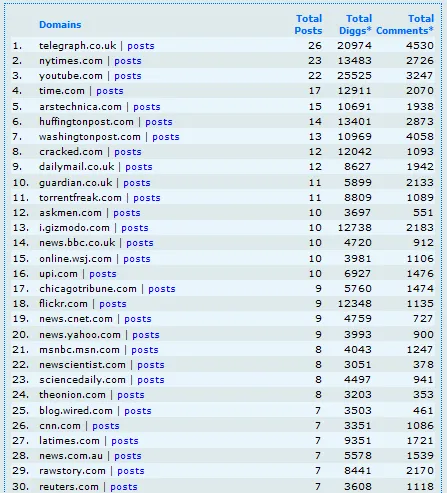Recent changes and restrictions made by Digg.com to encourage diversity in the range of users whose submissions reach the front page have had 2 profound results. Newer and less active users have seen their stories reach the front page, but the sources that are able to hit the front page have tightened.
Despite tens of thousands of submissions every week, the last seven days have shown that 46.6% of the Digg front page comes from 50 websites, according to data accumulated on di66.net.

The algorithm that Digg.com uses to determine which user-submitted content reaches the front page is in a constant state of flux. With millions of users and over 10,000 submissions per day, the site has been a target for spammers and casual social media enthusiasts who want their content to hit and reap the benefits of tens of thousands of visitors in a short period of time.
To combat the “algorithm gamers” and “power-users” on the site, Digg has launched several measures to discourage the practice of blind digging where users digg hundreds of stories quickly in hopes that others will reciprocate. The most recent restriction allows users to Digg approximately 200 stories in a 24 hour period before getting a “Whoa Cowboy” message. Once the limit is reached, they cannot Digg again until they go below the 24 hour threshold.
Digg: Diversify or Die
While the site has succeeded in putting new users on the front page, most of them are getting there by submitting from “whitelisted” sites. In many ways, Digg has become the personal RSS feed for sites like TorrentFreak, xkcd, and Cracked as the vast majority of submissions from these and other sites will hit the front page regardless of the submitter. Major news sites such as Telegraph, NYTimes, and Time receive millions of visits from Digg every month.
Digg grew as a source for cutting edge, hard to find pieces of content, but over the years has shifted to the safety of “going with what works”. New sites are finding stronger exposure from social media websites like Reddit, StumbleUpon, and even Twitter where the strength of the content is a more important factor than the strength of the domain name.
It isn’t completely Digg’s fault. They have been the focal point of attempts to “game the system” for a long time and have tried to implement countermeasures against it. When a site gets pushed too hard through shouts, IMs, and other methods of inflating Digg counts, the spam portion of the algorithm recognizes it and prevents these sites from hitting. Some sites get banned, but most are simply filtered out by not allowing these sites to get recommended in the upcoming section. These submissions can get 200, even 300 Diggs and never hit the front page.
While this form of “autobury” is a necessary component to prevent spam, it also makes it exceptionally difficult for websites to hit the front page more than once or twice if they are not already accepted as whitelisted by the algorithm. Great content that receives tremendous approval on other social media sites doesn’t have a chance on Digg if the domain cannot make it passed these filters.
There are ways that Digg can encourage great content from a more diverse range of websites without compromising quality by allowing spam to hit. Are they willing to pursue these ways?
Do they want to diversify the front page?
If so, are they willing to ask for help?
When less than 1% of the sites submitted control 46% of the front page, diversity is dead.
JD Rucker is a social media strategist and blogger in Orange County, CA. He operates this Social Media Blog and is on Digg and Twitter, Reddit, and StumbleUpon.
